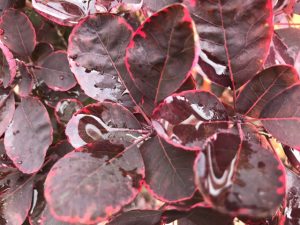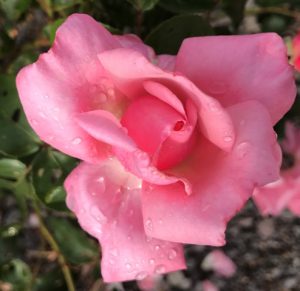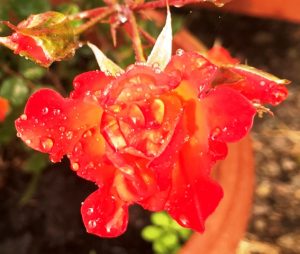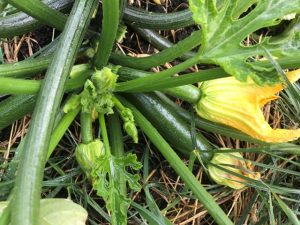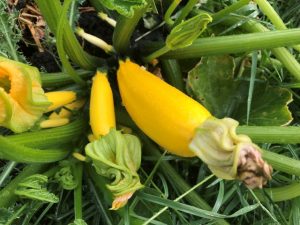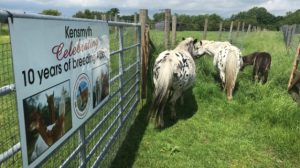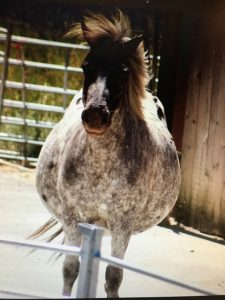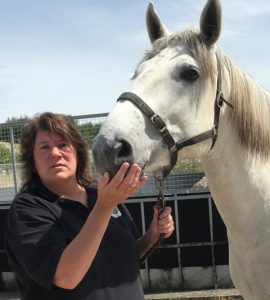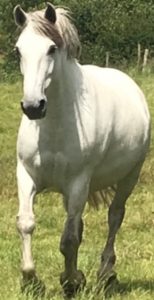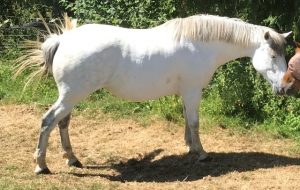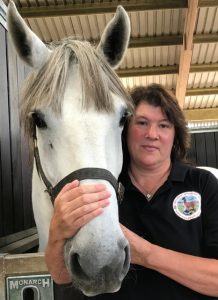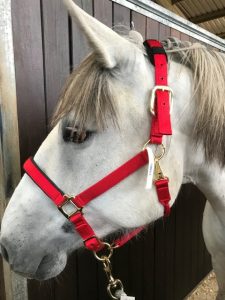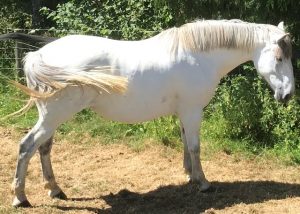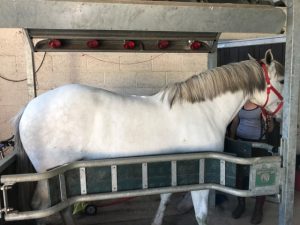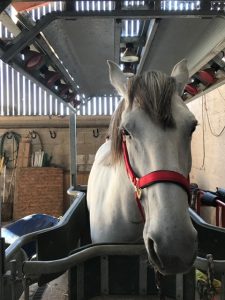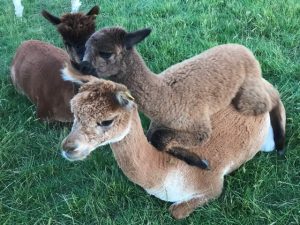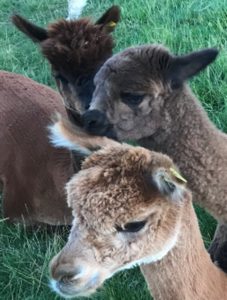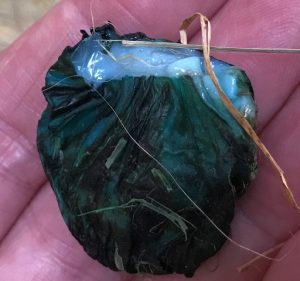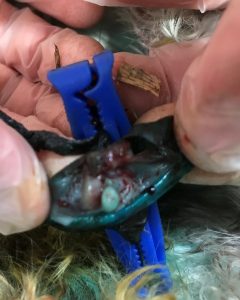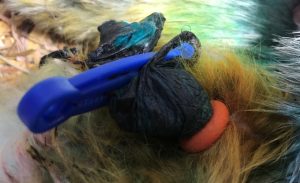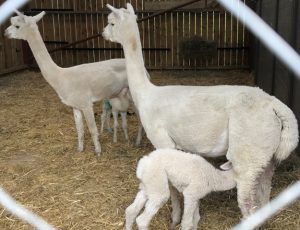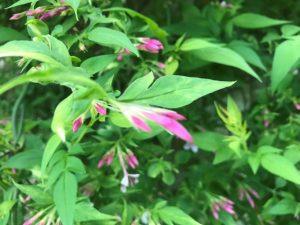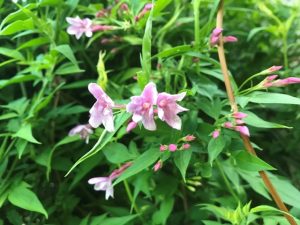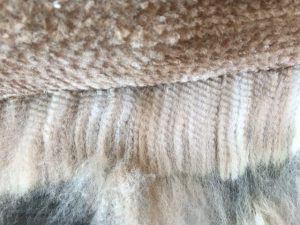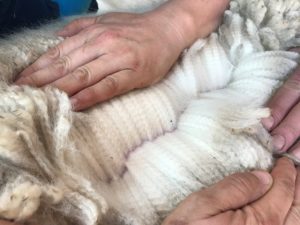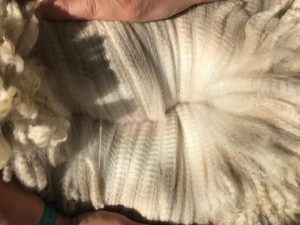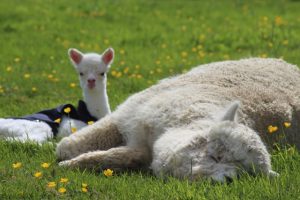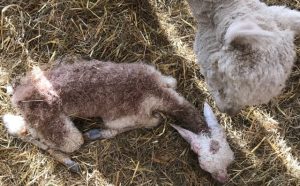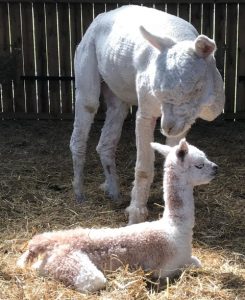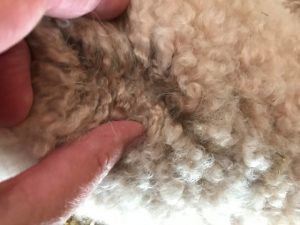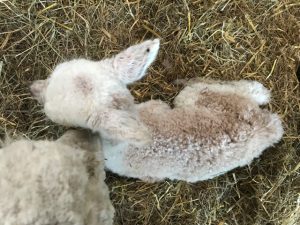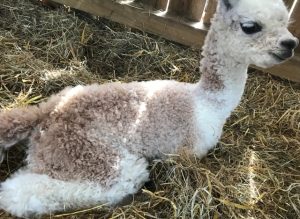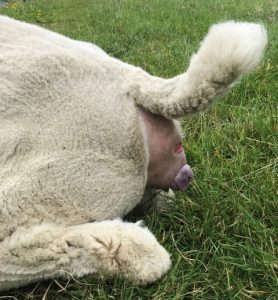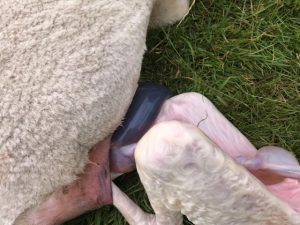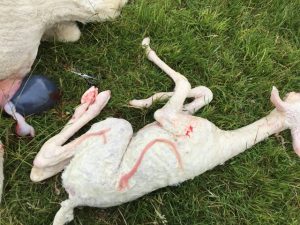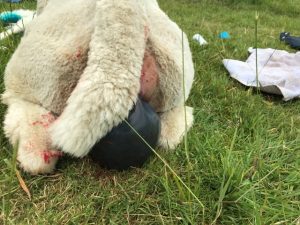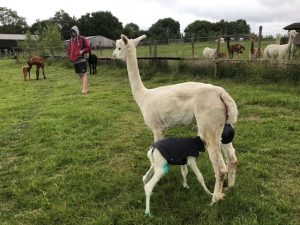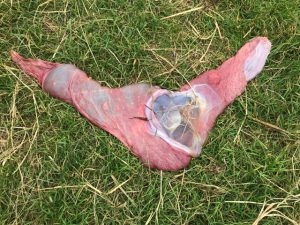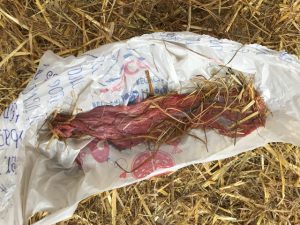Summer heatwave continues at Kensmyth, Clay Meadow
well the heat continues to stop the grass growing but Im pleased to say we have had our Hay delivered ready for Winter. Hard to think of Winter in near 30 degree heat but practicalities of Farming mean you need to plan well ahead for the feeding of your livestock. Meantime beauty flourishes at Kensmyth as we continue Alpaca Walks and Experiences with so many Cria on the ground, its lovely to see the delight in others when seeing Alpaca for the first time – after nearly 12 years I have never lost that feeling either!
Cotswold Show and Courgettes at Kensmyth, Clay Meadow
Because its a big ‘orse at Kensmyth, Clay Meadow
most regular readers and returning visitors know about Kensmyth Equines but I am being chastised for not putting up more about them – it is an Alpaca blog but as we are between Cria Drops for Alpaca babies I grabbed a few snaps and here goes… for the horsey lovers and visitors who have grown to love them…
yes, one of our track grass munchers mares foaled early, yes, the other track tidying grass muncher mare has not foaled yet – place your bets they are grazed anywhere it is in shade at the moment bless!
one of our big Irish Draught (17.1 hh) mares is being scanned for pregnancy again shortly by AI – that’s artificial insemination and the stallion used (Sire) is a very well kept secret. great expectations for that Rare Breed Foal in 2019. and yes I look very grumpy in all photos because it was very hot and I was looking into the sun – she will be home very soon and yes, she is VERY big lol!
and our second big mare will also be arriving home shortly too, its great to have friends who have the facilities that we don’t have here and don’t charge us for them – you know who you are so big thanks to you guys too!
Red Hot July 2018 we welcome you at Kensmyth, Clay Meadow
it has been a scorching few days at Kensmyth, the ponies eating the lanes have enjoyed the long grass, the Alpaca are always left strips of longer grass which retains the cooler moisture much needed for them and their newborns and Camelid mating has been all through the night and early hours due to raging temperatures when Alpaca should not be mated.
How to welcome July 2018 at Kensmyth? what better than some scorching red Sunset Shots taken a short while ago.
Welcome July
Cria orgling practice in full swing at Kensmyth, Clay Meadow
Dont read this post if you are squeamish – part 2 umbilical cord Alpaca cria
Please remember this post is put here not to shock but to show what can happen and how to deal with it
you will recall my previous post where the cria was coming out cushed and after getting the cria out, obviously I had to cut the cord. this is perfectly normal, as is a larger cord due to strain from difficult birthing.
so in Part 2, you see that the Cord has started drying – hand holding partial cut cord…
so we recall that the cria had a CLAMP put on at birth when the cord was cut and this although plastic and lightweight is nevertheless cumbersome and a risk for catching… so as the cord dries out, it is always better to remove the Clamp as soon as practical and sensible. ALWAYS have several cord clamps in your birthing box.
This takes real skill and guess work. you also need to be prepared for the fact that it may still cause a bleed and need putting back on – very quickly. They are not the easiest things to work with either.
So, after an appropriate time (at least 24 hours plus), a clamp removal was attempted with “stand by” assistance.
the Clamp is removed and the cord sprayed with iodine spray / antibiotic spray where it was. a small amount of blood should congeal when laid down. Then you permit the cria to stand. if blood drips immediately, then the clamp needs to go back on FAST. obviously all blood in any weather, let alone this weather should be immediately cleaned to prevent flystrike.
Clamp on showing insides and hoping dried above clamp…
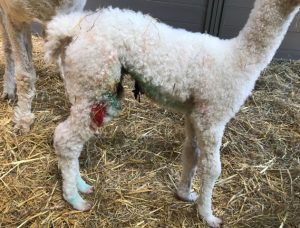 clearly it needed more drying time as bled again SO in order to prevent a potential HERNIA by having the clamp on an umbilical cord hanging down ..
clearly it needed more drying time as bled again SO in order to prevent a potential HERNIA by having the clamp on an umbilical cord hanging down ..
LAMB RING the top after checking no intestines caught… leaving both CLAMP and LAMB RING to fall off naturally
Happy Cria all the time, blood washed off and exclusive night in before going out again just to ensure no issues.
don’t forget the ANTIBIOTIC to prevent infection
Please remember this post is put here not to shock but to show what can happen and how to deal with it
Reliable routine and beauty in the Cotswolds
One instinctively knows when something is right, Kensmyth, Clay Meadow
most readers following this will know that Colour predictions in horses was a speciality of mine, even getting down to white socks and blazes!
Well, Alpaca colour predictions are more “random” because the interpretations of colour in people who register their Alpaca is different and often patches are forgotten because they are “allowed” if the blanket is one solid colour in the fleece of an Alpaca.
So when Blogging about mating last year, I put on there that I had experimented this year with some and that I was hoping for some “secrets too”.
Well, about 3 am today a female whom I had waited a long time for (home bred) gave birth to what I had really been hoping for. Several weeks late of course and a Maiden but 4 years wait was totally worth it for the gorgeous boy she produced for us.
White fleeces on large Alpaca are our speciality but we do not venture to compete with the Black Breeders of the Alpaca industry, rather we reproduce what we know IS our speciality – top fleeces from top Alpaca that are large and so the fleeces can do so much.
One Alpaca was mated (one year) and gave birth to a white daughter which we waited to mate (two years more) and her gestation ended today (one year) so a total of 4 years waiting for this boy – our MINI ME!
Most Alpaca breeders would not jump for joy at his production because although SPOTTY he is also deemed a Fancy or Multi in the Alpaca world BUT the fleece on him is exceptional as is his mothers (white) and Grandmothers (same colour)
Here is the Grandmother at pre shearing with her obviously solid white cria and then post shearing showing her fab fleece:
and here is her SOLID WHITE daughter with our best ever prediction today.
How did I manage that folks… now THAT would be telling!!
he even has his Grandmums spots – MARVELLOUS
one instinctively knows when something is wrong… Kensmyth, Clay Meadow
A lifetime of farming teaches you how to “know” your livestock. When you are with them 24/7 you understand more than “gut” feelings and often the animals do too. When something is wrong, if you know them it is easy to spot but not often easy to rectify.
This female is a Maiden, very big but was mated by a smaller Stud boy as I knew the line throws humungous cria.
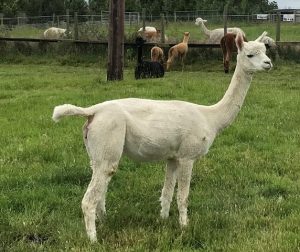 I have put this Blog up here for those who think Alpaca birth in the morning and that it is a 15 minute easy process. Rest assured it is not.
I have put this Blog up here for those who think Alpaca birth in the morning and that it is a 15 minute easy process. Rest assured it is not.
This female started at 4 am and I managed to get the cria out at 4pm the next day. Most would not see the very first signs and it is these that if you miss, you do not know when precisely to intervene.
I know my Alpaca so well that they will often come and birth by me and the birthing kit.
I knew it was not looking good by the length of time to dilate
We have a “CODE RED” call in our house and I summoned Mitchell so that I could have a “feel” to see what was wrong inside.
Unfortunately, the cria inside was literally kneeling in a cushed position with both knees and head trying to come through at the same time.
It is an impossible situation and I want to thank my friend who guided me through on iPhone speakerphone because it requires someone knowledgable at the other end for moral support when the Vet is too far away.
This was my Fathers Day folks…
obviously there is a massive time lapse in these photos and the next are not for the faint hearted…
I had to go in with one hand, obviously well cleansed and lubricated and inch by inch slowly push the head and shoulders back until I could get a second hand in to enable a “hold”. clearly this is high risk as you are pressing on the neck of the already externally breathing cria. it is save one, both or none time in these situations.
With Mitch sterlingly calming the Mum to be of which he has many years experience, I gently managed to ease the cria out – at which point you are hoping that nothing else follows. This is such a serious exercise that if done too quickly you can cause prolapse, the whole womb to come out and no guesses for what happens to the mother in those situations.
I cut the cord, clamped it, dealt with the cria and then it is a waiting game to see how Mum is. Mitchell keeping her calm and cushed for as long as possible. During which time she received antibiotic and pain relief injections from me.
clearly the situation has to be kept calm and is not for those without serious patience and knowledge
the sheer weight of the placenta can bring more out and the mother needs the cria at her head to give her the strength and will to live in these situations
but it does have a happy ending…
keeping the other mums at a distance for several hours until mum is able to be gently walked to the barns after passing the placenta takes time because everyone wants to see the new arrival
when the placenta is passed, unsurprisingly it is not “full” so danger is by no means over
CCTV watching and monitoring all night reveals the passing of the second part of the missing horn
but the next instalment of this particular birthing will cover the CORD on the cria
do not think in these situations that its all done and dusted at this point – back soon!
Happy Fathers Day Dads and to all Farmers from Kensmyth, Clay Meadow
Happy Fathers Day Dad
– you know I would love to be with you today and share with the family but as a Farmer we look after our livestock first and foremost.
We miss Family events (unless held here) all year round but it is our love of the livestock and countryside that keeps us going.
Here are some beautiful flowers that smell wonderful, like your aftershave DAD.
Archives
- December 2024
- November 2024
- October 2024
- September 2024
- August 2024
- July 2024
- June 2024
- May 2024
- April 2024
- March 2024
- February 2024
- January 2024
- December 2023
- November 2023
- October 2023
- September 2023
- August 2023
- July 2023
- June 2023
- May 2023
- April 2023
- March 2023
- February 2023
- January 2023
- December 2022
- November 2022
- October 2022
- September 2022
- August 2022
- July 2022
- June 2022
- May 2022
- April 2022
- March 2022
- February 2022
- January 2022
- December 2021
- November 2021
- October 2021
- September 2021
- August 2021
- July 2021
- June 2021
- May 2021
- April 2021
- March 2021
- February 2021
- January 2021
- December 2020
- November 2020
- October 2020
- September 2020
- August 2020
- July 2020
- June 2020
- May 2020
- April 2020
- March 2020
- February 2020
- January 2020
- December 2019
- November 2019
- October 2019
- September 2019
- August 2019
- July 2019
- June 2019
- May 2019
- April 2019
- March 2019
- February 2019
- January 2019
- December 2018
- November 2018
- October 2018
- September 2018
- August 2018
- July 2018
- June 2018
- May 2018
- April 2018
- March 2018
- February 2018
- January 2018
- December 2017
- November 2017
- October 2017
- September 2017
- August 2017
- July 2017
- June 2017
- May 2017
- April 2017
- March 2017
- February 2017
- January 2017
- December 2016
- November 2016
- October 2016
- September 2016
- August 2016
- July 2016
- June 2016
- May 2016
- April 2016
- March 2016
- February 2016
- January 2016
- December 2015
- November 2015
- October 2015
- September 2015
- August 2015
- July 2015
- June 2015
- May 2015
- April 2015
- March 2015
- February 2015
- January 2015
- December 2014
- November 2014
- October 2014
- September 2014
- August 2014
- July 2014
- June 2014
- May 2014
- April 2014
- March 2014
- December 2013
- November 2013
- September 2013
- May 2013
- March 2013
- February 2013
